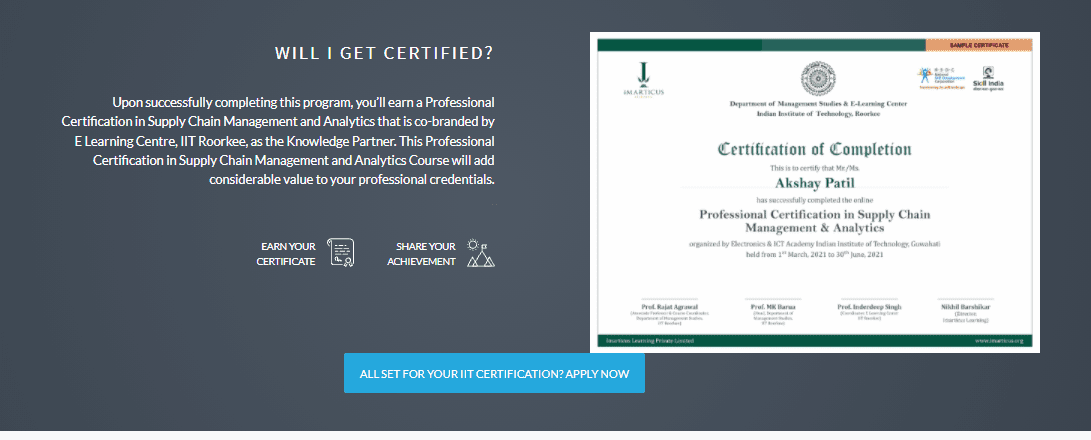Things I wish I knew before choosing a supply chain certification
Supply chain management, as a program, is concerned with managing the entirety of the process of production of goods or services, all the way from procuring raw materials to delivering the final product to the consumer. A company creates a network of suppliers (the “links” in the chain) to move products from raw material suppliers to organisations that interact directly with the consumers. Therefore, a supply chain certification ensures that an individual has better prospects and opportunities for future economic ventures.
Careers in supply chain management
1. Purchasing manager
Purchasing Manager, also known as Purchase Manager or Procurement Manager entails the manager’s role to be purchasing goods and services for resale or business use. They must seek the best quality at the lowest, most economic price. Purchasing manager responsibilities vary by industry.
2. Strategic planner
The Strategic Planner handles the business strategy planning of companies. A strategic planner, who knows all aspects of their employer’s business, as part of their responsibility, suggests strategic recommendations to senior decision makers. After accumulating experience and proven success, one can be promoted to senior strategist, leading one’s own team.
3. Material analyst
A material analyst ensures the undisturbed flow of goods between the company’s distribution chains. Material analysts perform numerous tasks for a company. They ensure that the company’s inventory is regularly updated and sufficient to sustain all the projects the company plans to undertake in the future.
4. Supply chain manager
Supply chain managers are involved from the time a company begins its process of developing new products until the finished product is manufactured in large numbers and shipped off for sale. These kinds of managers help improve the efficiency, productivity and safety of supply chains and businesses in general.
5. Warehouse manager
Warehouse Managers are in charge of the receiving, storing and safe transporting of goods. Warehousing is an essential part of supply chains and thus, warehouse managers are critical for handling processes, systems and people that are involved with their respective supply chains.
The Dos and Don’ts of Supply Chain Management
Do: Procure and analyse data from your entire supply chain
Technological development in the business world has enabled a greater, holistic understanding of more data points in businesses. Not only can you gather information surrounding the day-to-day operation of your business, but this data collection can be done automatically, ensuring faster and more accurate modelling. One could leverage new SCM software with advanced data analysis tools to ensure knowledge of the particulars of your operations. Whether it’s identifying disputes or anticipating requests and delays, you can make informed decisions to strengthen your business.
Don’t: Get distracted by trivial issues
In supply chains, you must find a way to rid your business of unnecessary baggage, but don’t get caught up in trying to fix minor disputes that cause bottlenecks along the value chain. This is not to say ignore these problems completely, but rather try to solve problems according to their impact.
Therefore, to conclude, supply chain management entails handling the flow of goods and services between businesses and locations. It deals with the movement and storage of materials, work-in-progress, and finished goods and takes several measures to guarantee order fulfilment from point of origin to point of consumption.
The IIT Supply Chain Course
Objectives of the course:
- To develop a greater understanding of various supply chains and logistics processes and offer after a thorough evaluation, a supply chain certification, to promising individuals.
- To develop and analyse the part digital transformation plays in the supply chains and logistics processes.
- To ensure effective analysis of logistics processes and supply chains in the digital age, through introductions of new and necessary digital methods, such as software, websites, and so on.
- To promote a better understanding of the roadmap for improved development of a sustainable industry, 4.0 perspective on logistics and supply chain management.
Eligibility for the IIT supply chain course
- For Indian Applicants – Graduates from an accredited university (State Government/AICTE/UGC) in any discipline.
- For Non-Indian Applicants – Diploma or equivalent qualification from a recognized university or institution in their respective country.
- Working professionals with a minimum of 2 years of experience and 4 years of professional experience (degree holders).
- On a case-by-case basis, less experienced individuals may be considered.
Conclusion
A career in supply chain management can provide an individual with better learning opportunities, career prospects, training and a secured future. Supply chains are the backbones of businesses around the world and supply chain experts are essential assets for companies.




 Other than being a top course endorsed by an IIT, this allows the aspirants to become better at decision making. It also permits an in-campus interaction with other students and faculty.
Other than being a top course endorsed by an IIT, this allows the aspirants to become better at decision making. It also permits an in-campus interaction with other students and faculty.